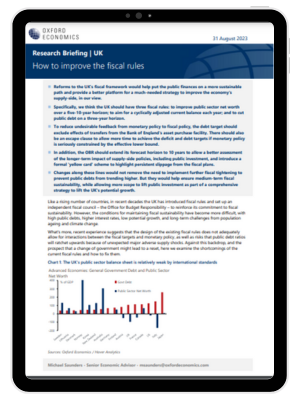How to improve the fiscal rules

Reforms to the UK’s fiscal framework would help put the public finances on a more sustainable path and provide a better platform for a much-needed strategy to improve the economy’s supply side, in our view.
Specifically, we think the UK should have three fiscal rules: to improve public sector net worth over a five-10-year horizon; to aim for a cyclically adjusted current balance each year; and to cut public debt on a three-year horizon.
To reduce undesirable feedback from monetary policy to fiscal policy, the debt target should exclude the effects of transfers from the Bank of England’s asset purchase facility. There should also be an escape clause to allow more time to achieve the deficit and debt targets if monetary policy is seriously constrained by the effective lower bound.
In addition, the OBR should extend its forecast horizon to 10 years to allow a better assessment of the longer-term impact of supply-side policies, including public investment, and introduce a formal ‘yellow card’ scheme to highlight persistent slippage from the fiscal plans.
Changes along these lines would not remove the need to implement further fiscal tightening to prevent public debts from trending higher. But they would help ensure medium-term fiscal sustainability, while allowing more scope to lift public investment as part of a comprehensive strategy to lift the UK’s potential growth.
Tags:
Related posts

Post
‘Liberation Day’ 24% tariff will limit Japan’s growth
The 'Liberation Day' tariffs, together with separately announced higher tariffs on auto imports to the US, will lead us to cut our growth forecast for Japan. The direct impact of the tariffs will end the modest growth we projected in March, and we now think the economy will barely grow in 2025-2026. This initial estimate does not consider the indirect impact from high trade policy uncertainty and retaliation from other economies.
Find Out More
Post
Europe’s defence splurge will help industry – but by how much?
Our baseline forecast now assumes that European defence spending will rise to 3% of GDP by the end of the decade. This could give a growth boost to Europe's ailing industrial sector.
Find Out More
Post
Japan’s on course for July rate hike, but risk of June increases
The Bank of Japan (BoJ) kept its policy rate at 0.50% at Wednesday's meeting, as expected. Despite a marginally higher increase in pay than last year at the first round of the spring wage negotiations, our baseline view is for the BoJ to hike its policy rate only gradually due to concerns about the capacity of small firms to raise wages and the lacklustre rate of consumption.
Find Out More